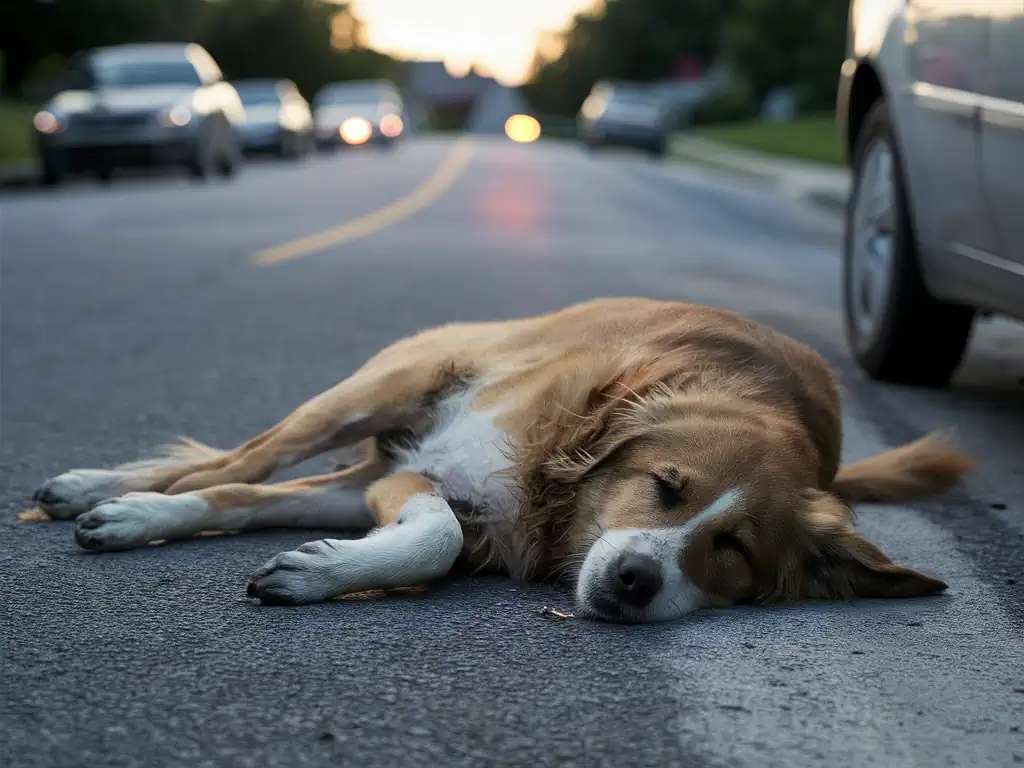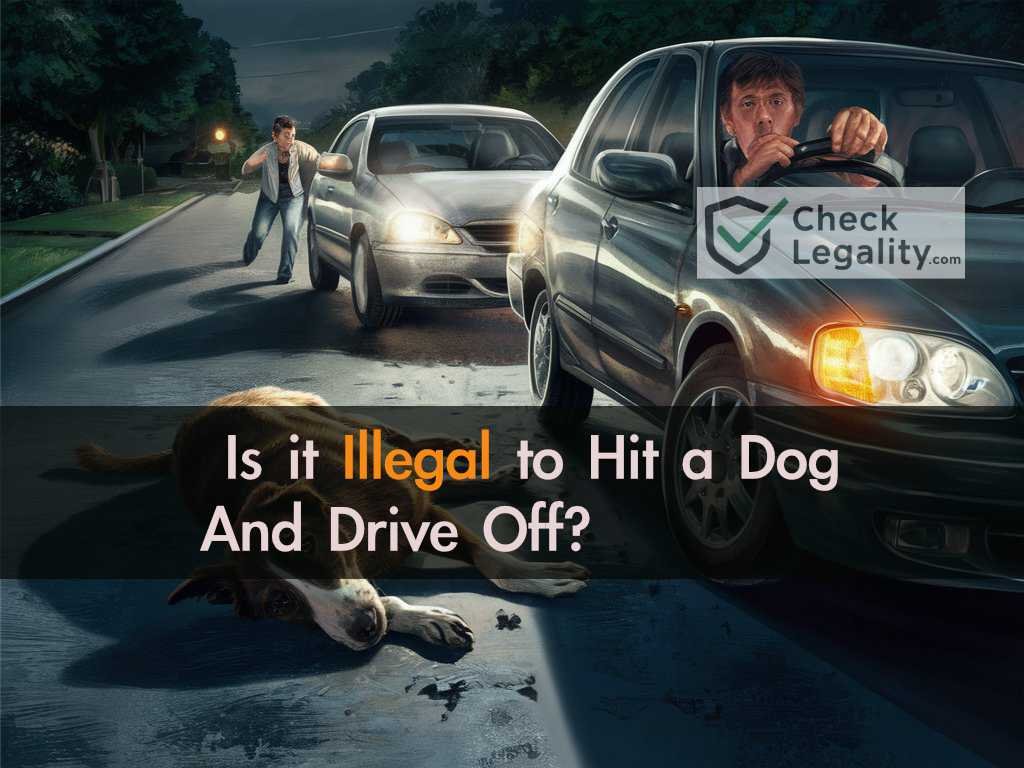Is it illegal to hit a dog and drive off?
This question might pop into your head after learning that countless accidents on roads involve animals every year, and dogs, as beloved pets and frequent companions in public spaces, are often among the victims. These incidents can happen unexpectedly and raise immediate questions about legal obligations and moral responsibilities for drivers. One particularly distressing scenario is hitting a dog with a vehicle and then leaving the scene. This action not only poses serious ethical and humane questions but also potential legal repercussions.
This article aims to clarify the legality involved when a driver hits a dog and decides to drive off instead of calling for help. What are the obligations under the law? What responsibilities do drivers hold towards animals? Understanding these aspects is crucial for any driver, as it informs how to react in such unfortunate situations appropriately and emphasizes the importance of compassionate and lawful behavior on the roads.
This article will provide clarity and guidance on this complex, nerve-wracking, and unfortunate issue, ensuring all drivers, whether driving a car or motorcycle, are well-informed of their duties and the potential consequences of their actions when ignored. Join us as we look into whether it is illegal to hit a dog and drive off and what one should ideally do in the wake of such an incident.
Is it Illegal to Hit a Dog And Drive Off? – A Legal Overview

When a vehicle incident involves a dog, the legal implications can vary significantly depending on the jurisdiction. However, some general legal principles and frameworks typically apply to these types of unfortunate situations. Understanding what they are can help clarify drivers’ responsibilities and potential liabilities.
Legalities on Hitting a Dog and Driving Off
- Duty of Care: Legally, drivers are generally expected to exercise a reasonable duty of care while operating a vehicle. This duty extends to all road users, including pedestrians, other vehicles, and animals. Failing to exercise this duty, especially after an incident, can lead to legal consequences.
- Property Law Considerations: In many places, pets such as dogs are considered personal property. Hitting a dog and not stopping can sometimes be treated similarly to damaging someone’s parked car and leaving the scene. This can involve liabilities for property damage.
- Criminal Liabilities: Depending on the state or country, leaving the scene after hitting a dog without attempting to report or address the situation can be deemed a criminal offense. This is especially true if the action reflects deliberate negligence or cruelty.
Understanding “Hit and Run” Laws
“Hit and run” laws that apply to accidents involving other vehicles or pedestrians also sometimes extend to hitting domestic animals. The specifics can vary; for example, in New York and generally in many places in the United States, it is illegal to hit a dog and drive off or any property at all without taking appropriate action.:
- Reporting Requirements: In many regions, the law requires a person who has hit a dog to report the incident to either the police, local animal control, or the owner of the dog, if possible.
- Legal Penalties: Failing to report can lead to fines, and in cases where negligence is proven, more severe penalties such as criminal charges could be applied.
It’s important to note that while there’s a moral and sometimes legal obligation to assist an injured animal, the specifics of what actions are legally required can differ by local laws.
What the Law Says About Hitting a Dog and Driving Off
Understanding the specific legal requirements and potential consequences when a driver hits a dog is essential for navigating these challenging situations responsibly. Laws concerning incidents involving animals vary widely depending on the jurisdiction, but there are common legal considerations that typically apply.
State and Local Laws
- Legal Obligations: Most states have laws that explicitly require drivers who hit a dog to stop at the scene, provide aid, and report the incident to authorities. These laws are designed to ensure that injured animals receive necessary care and that owners have the opportunity to be notified about the state of their pets.
- Failure to Stop and Report: Leaving the scene without fulfilling these obligations can result in significant legal repercussions. These might include fines, misdemeanor charges, or even felony charges if the incident is deemed a deliberate act of cruelty or gross negligence.
Penalties for Leaving the Scene
The penalties for hitting a dog and driving off without stopping can be severe, reflecting the seriousness with which many jurisdictions treat the welfare of animals:
- Fines: Monetary penalties for failing to stop can range from nominal fines to substantial amounts, depending on the state and the circumstances surrounding the incident.
- Criminal Charges: In cases where negligence or cruelty is involved, criminal charges can be levied against the driver. This might include charges of animal cruelty or destruction of property.
- Civil Liabilities: Additionally, the driver might face civil lawsuits from the dog’s owner for compensation related to veterinary costs, emotional distress, and other damages.
Mandatory Reporting
In many areas, specific laws require the driver to report any accident involving a dog to the relevant authorities, which could be local animal control agencies, the police, or both. This reporting is crucial for several reasons:
- Animal Welfare: Quick reporting can significantly improve the chances of recovery for an injured animal by facilitating timely medical intervention.
- Owner Notification: Reporting also allows for the dog’s owner to be promptly notified, which is not only a legal requirement in many places but also a basic courtesy and moral obligation.
Ethical Considerations

While the legal imperatives are clear, the ethical considerations surrounding such incidents can sometimes be even more compelling. The decision to drive away after hitting a dog speaks to broader ethical questions about the responsibility we owe to other beings, particularly animals, which depend on human empathy and intervention for their welfare.
While legal frameworks provide the boundaries within which individuals must operate, ethical considerations often guide our actions within those boundaries. In the case of hitting a dog with a vehicle, the ethical implications are significant and warrant careful consideration.
Moral Responsibilities of Drivers
- Compassion for Living Beings: Ethically, animals are deserving of compassion and care. Injuring a dog and leaving the scene without attempting to help or notify someone disregard this ethical duty to treat living beings with respect and kindness.
- Community Trust and Social Responsibility: Drivers are part of a community, and their actions contribute to a culture of either responsibility or neglect. Ethically, there is an obligation to foster a community where all members, human and non-human, feel safe and valued.
- Accountability for Actions: Ethically, individuals must take responsibility for their actions and their consequences. Hitting an animal and choosing to leave the scene can be seen as an attempt to evade this responsibility, which is morally questionable.
- Public Perception: Society generally frowns upon individuals who harm animals and show indifference by leaving them injured without help. Such actions can lead to public outrage and damage to one’s personal and professional reputation.
- Legal and Ethical Alignment: In many cases, what is legal aligns closely with what is ethical. However, when the law is ambiguous or minimally enforced, it is the ethical considerations that should guide a person’s actions.
What to Do if You Hit a Dog
Knowing the appropriate actions to take immediately after hitting a dog not only ensures compliance with legal obligations but also aligns with ethical responsibilities. Here are the steps you should follow:
Immediate Actions
- Stop Safely: Pull over to a safe spot on the road. This ensures your safety and the safety of other road users.
- Check the Dog: If it is safe to do so, check the condition of the dog. Do not attempt to move the dog unless it is in immediate danger, as moving it wrongly could cause further injury.
- Contact Authorities: Immediately call local animal control or the police. Reporting the incident is not just a legal requirement but also a step towards ensuring the dog receives the necessary medical attention.
- Wait for Help: If possible, wait at the scene until help arrives. This can sometimes be crucial in providing information or assistance that could save the dog’s life.
- Notify the Owner: If the dog has identification, try to contact the owner directly. If not, animal control or the police can handle the notification.
Document the Incident
- Take Photos: If it’s safe and feasible, take photos of the scene, the dog, and any relevant surroundings. This documentation can be helpful for the authorities and the owner.
- Gather Witnesses: If there are any witnesses, collect their contact information. They could provide additional details about the incident.
Preventative Measures
Preventing accidents with animals is beneficial for all involved and can be achieved through several proactive driving practices:
- Drive Cautiously in Animal-Prone Areas: Increase awareness in areas known to have domestic animals and wildlife. Reducing speed and staying vigilant can prevent many accidents.
- Use Animal Detection Systems: Some modern vehicles are equipped with systems that can detect animals on the road and alert the driver, giving them more time to react.
- Educate Others: Share knowledge about the importance of careful driving to protect animals and the steps to take if an animal is hit. Education can significantly reduce the frequency of these incidents.
Staying in The Right Mindset After Such Unfortunate Event
- Seeking Support: Hitting a dog can be a traumatic experience, and it is important to seek emotional support to help process your feelings. Reach out to friends, family, or a therapist who can provide a listening ear and offer guidance on coping with the emotions that may arise.
- Learn from the Experience: Take this unfortunate incident as an opportunity to learn and educate yourself about safe driving practices. Reflect on what could have been done differently to prevent the accident and make a conscious effort to be more cautious and vigilant on the road in the future.
- Support Animal Welfare Organizations: Consider making a donation or volunteering your time to local animal welfare organizations. They play a vital role in rescuing, rehabilitating, and finding new homes for injured or abandoned animals. Your support can make a difference in the lives of these animals and help prevent future accidents.
Conclusion
The question of whether it is illegal to hit a dog and drive off is complemented by profound ethical considerations. Legally, most jurisdictions require you to stop and report the incident. Ethically, there is a moral duty to ensure the welfare of the injured dog as far as possible. By understanding both the legal obligations and moral imperatives, drivers can better navigate these distressing situations and contribute to a more caring and responsible society.


